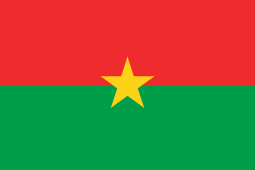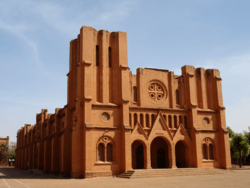Religion in Burkina Faso
Burkina Faso is a religiously diverse society, with Islam being the dominant religion. According to a recent census (2019) conducted by the Government of Burkina Faso, 60.5% of the population adheres to Islam. The vast majority of Muslims in Burkina Faso are Malikite Sunni, deeply influenced by Sufism.[2][3] The Shi'a branch of Islam also has a small presence in the country. A significant number of Sunni Muslims identify with the Tijaniyah Sufi order. The Government also estimated that 23.2% practices Christianity (19.0% being Roman Catholic, 4.2% being Protestant), 15.3% follow Animism i.e., African traditional religion, 0.6% have other religions, and 0.4% have none.[2][3]
Religion in Burkina Faso (2008)[1]
| Part of a series on the |
| Culture of Burkina Faso |
|---|
 |
| History |
| People |
| Languages |
| Cuisine |
| Religion |
| Art |
| Literature |
|
Music and performing arts |
|
Media |
| Sport |
|
Monuments
|
|
Symbols |
Statistics
Statistics on religion in Burkina Faso are inexact, because Islam and Christianity are often practiced in tandem with African traditional religions. The Government of Burkina Faso stated in its most recent census (2008) that 60.5 of the population practice Islam, and that the majority of this group belong to the Sunni branch,[2][3] while a growing minority adheres to the Shi'a branch. A significant number of Sunni Muslims identify with the Tijaniyah Sufi order. The Government has also estimated that some 23.2 are Christians (16% being Roman Catholics and 3.2% members of various Protestant denominations), 15.3% follow Traditional indigenous beliefs such as the Dogon religion, 0.6% have other religions, and 0.4% have none (atheism is virtually nonexistent).[2][3]
Statistics on religious affiliation are approximate because Syncretism, incorporating traditional indigenous beliefs and practices, is widespread among both Christians and Muslims.[3] The majority of citizens practice traditional indigenous religious beliefs to varying degrees, and strict adherence to Christian and Muslim beliefs is often nominal.[3] Almost all citizens are believers, and atheism is virtually nonexistent. One 2015 study estimates some 200,000 Christian believers from a Muslim background in the country, though not all are citizens.[4][5]
| Year | Islam | Catholics | Protestant | Traditional/Animist | Other | Without religion |
|---|---|---|---|---|---|---|
| 2017 (Census) | 60% | 19% | 4.2% | 13.3% | 1.1% (including Irreligious) | |
| 2019 (DHS estimates) | 60% | 19% | 4.2% | 5% | 1% | 0.4% |
Geography
Muslims reside largely around the northern, eastern, and western borders, while Christians live in the center of the country.[3] People practice traditional indigenous religious beliefs throughout the country, especially in rural communities.[3] Ouagadougou, the capital, has a mixed Muslim and Christian population; however, Bobo-Dioulasso, the country's second-largest city, is mostly Muslim.[3] Small Syrian and Lebanese immigrant communities reside in the two largest cities, and are overwhelmingly (more than 90 percent) Christian.[3]
Ethnicity
There are more than 60 different ethnicities in the country.[3] Most ethnic groups are religiously heterogeneous, although the Fula and Dioula communities are majority-Muslim.[3]
See also
- Islam in Burkina Faso
- Roman Catholicism in Burkina Faso
- Freedom of religion in Burkina Faso
References
- Comité national du recensement (July 2008). "Recensement général de la population et de l'habitation de 2006" (PDF). Conseil national de la statistique. Archived from the original (PDF) on 21 April 2011. Retrieved 20 January 2011.
- Comité national du recensement (July 2008). "Recensement général de la population et de l'habitation de 2006" (PDF). Conseil national de la statistique. Archived from the original (PDF) on 21 April 2011. Retrieved 20 January 2011.
- "International Religious Freedom Report 2010: Burkina Faso". United States Bureau of Democracy, Human Rights and Labor. November 17, 2010. Archived from the original on November 23, 2010. This article incorporates text from this source, which is in the public domain.
- Johnstone, Patrick; Miller, Duane A (2015). "Believers in Christ from a Muslim Background: A Global Census". IJRR. 11: 14. Retrieved 20 November 2015.
- "Enquête Démographique et de Santé et à Indicateurs Multiples (EDSBF-MICS IV) 2010" (PDF). April 2012.
